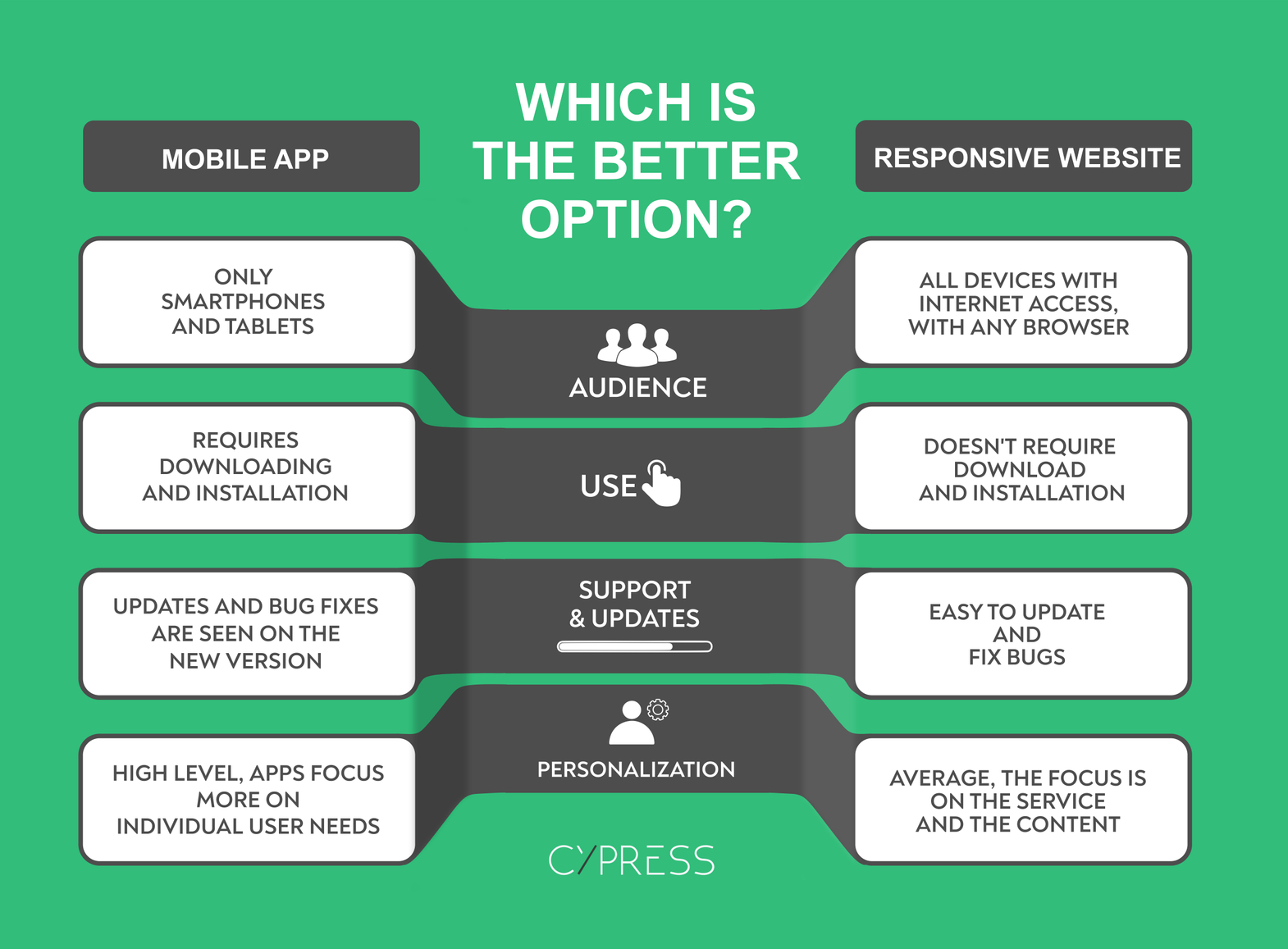Mobile App or a Responsive Website: Which is the better option?
Mobile app or a website? When you start your business and decide to establish your digital presence, you may wonder: Which is the better option for your business? Should I invest in developing a mobile app or a responsive website will do?
The difference may seem insignificant initially, but you start to see the differences if you get deeper into the topic. Mobile apps and responsive websites are interconnected, equally important, yet entirely different.
Go on reading if you are ready to find out the difference and finally decide which is the better option for you. You will see all the specific aspects of both mobile apps and responsive websites, and with these insights, you will be ready to make the right choice for your business's success.
What is a mobile app?
A mobile app is a piece of software that you install and use on your smartphone. As there are multiple operating systems on mobile devices, you develop them separately. The most popular ones are iOS and Android operating systems for mobile devices. This time, we will be focusing on native mobile apps that are accustomed to running on iOS and Android devices.
Mobile apps run only on smartphones and mobile devices and have a defined set of users. In contrast to mobile websites that work on all devices and have a higher number of returning and new visitors, mobile apps have more regular users.
Mobile apps usually have a targeted functionality that aims to ease a task. For example, you meditate daily, so; you will need to have an app that helps you concentrate. You can have your account on the meditation app and pick on the spot where you left the last time. The mobile app can give a more personalized user experience, for example by picking up the frequency of meditation and sending personalized notifications. This will be a unique experience for your user that cannot be accomplished on a website.
A well-designed mobile app will always stay on your client's device, and they will use it to complete daily activities. Mobile apps have unique user experiences that ensure the effectiveness of your application.
Mobile apps, however, should not be the clone of your mobile website. It is a common mistake in business that will confuse your audience. If your mobile app is the clone of your website, you are separating the traffic. Moreover, it will also not be apparent for your user why you have a mobile app, and the download rate will decrease eventually.
One of the favorable solutions, in this case, is to pick up the primary idea of your business and turn it into a mobile app. You can pick up the main functionality, finetune its use, and turn it into a mobile app.

Why should you leverage your business by developing a mobile app?
The future is mobile. Even today, mobile internet use is dominated by 87% of users spending their time on mobile apps, rather than on the mobile web. Therefore, you will expose your business to a higher number of potential clients and have a new revenue channel.
What are the key features of a mobile app?
- Mobile apps are based on specific features and functionality. Mobile apps cover a set of functionalities. They shouldn't be the same if you have both a website and a mobile app. Not only an identical product will confuse your users, but it may also be technically impossible. Some features are only for mobile, depending on the development technology. Therefore, you should consult with professionals before starting to implement a project.
- Mobile apps require downloading from one of the popular application stores. Besides downloading, you need to install the mobile app and sometimes access personal information or third-party services.
- Mobile apps use some mobile components that make the product much more useful. Mobile apps can work with your smartphone camera, GPS, touchscreen, and many more components.
- Mobile apps offer users an intuitive user interface that makes it easier to complete tasks. The mobile website interface is more of an adoption of the screen size, and it doesn’t fully cover the mobile experience. Whereas mobile apps have an intuitive user experience flow. And sometimes, users of mobile operating systems are already accustomed to their mobile experience so you can adjust your app to it.
- Mobile apps are customizable. Users can set up their preferences in the app settings for notifications or updates. Customization will help users get the most out of the app functionality. With more control over the mobile app, users are easier integrated into your environment. You can leverage many effective user-centric marketing strategies, for example, dynamic notifications. Those have proven to impact the engagement on your mobile app significantly.
- Mobile apps can work offline and be available anytime, anywhere. Mobile apps can fully function offline. And in case they need an internet connection, apps still can offer offline functionality and content.
What is a responsive website?
A responsive website is a simple website that can be accessed via any browser. A responsive website is also called a mobile website because it is specifically designed to fit the tiny screens of mobile devices.
A responsive website or a mobile website has a design that works on. The content on a mobile website fits into any size of a screen. The content perfectly fits the screen, whether a laptop or a small 6’ screen of the latest mobile phones.
Okay, then, you may have another question:
Why do I need a mobile website/ responsive website in the first place?
Statistics to the rescue; In 2021, mobile users were about 7 billion. Conclusions drawn - you need a mobile website to stay in front of approximately this many people.
Google has recently announced that it has switched to mobile-first indexing. So far, 59% of all organic Google search traffic comes from mobile devices. Therefore you have higher chances to appear on your customer's search if you have a mobile website.
Now imagine you need to find a mobile app development company to outsource your project; what is your first action? You run a search query on your mobile phone, don’t you? You are offered a valuable results page, and you quickly look through the websites. So we have another compelling reason to choose a mobile website for your business.
Let us not forget that when people look for information, they run a generic search on google. People do not go down the app stores to find an app as a first action. To be their first touchpoint, you need to establish your digital presence on the web and follow the best SEO practices anyway.
Besides having a responsive and mobile-friendly website, you also need it optimized. Your mobile website should be keyword optimized and follow all the search engine ranking standards. You will need an SEO specialist in your team.
You may also need to develop a mobile app for your business. However, in some cases, both a mobile app and a mobile website may be a necessity for your business. It depends on your target audience and the specific needs of your business.

What are the key features of a responsive website?
- Responsive websites are easy to update and support. Updating a process is much easier and faster than updating a mobile app. Changes are executed on the owner’s end, and users are not even notified. Your responsive website users will feel the joy of the updates and not be aware of any processes. Remember when your favorite mobile app has updates to install? You still need to update the store to access the latest version. It is a long process for the owner’s end to run the updates on the mobile app. So in this respect, a mobile website takes less time and effort to update than a mobile app.
- Responsive websites are available for all users. A mobile website is always there for your users and doesn't require further action. Mobile websites are not dependent on the operating system and will run on any smartphone. A website still needs an internet connection (if you do not download it and make it available offline on your specific device).
- Responsive or mobile websites are less costly. Having a mobile website for your business is enough to be present digitally. Your customers will find your mobile website wherever they are, irrespective of their device. Maintenance and development costs are lower for a website than for a mobile app. You will not need to develop a separate website for Android or iOS users. However, it would be best to have native mobile apps for both devices.
So should you choose a mobile app or a mobile website?
The benefits of both mobile apps and mobile websites are significant. Mobile apps are not better than mobile websites or vice versa. To make the most favorable decision for your business, you should understand the purpose of your product and, most notably, its target audience.
It depends on your target audience and their preferences. The statistics today seem to favor mobile apps over mobile websites. However, they are taking a generic audience that is not accurate for your business. For a more informed decision, you should understand the needs and preferences of your users.
With the complete picture of your audience preferences, you can always refer to our article to consider the technical benefits to choose. You can also save this infographic on Pinterest for any future reference.

You should also know that mobile apps require more budget than a responsive website. It is based on the technology stack and the various operating systems you need to develop native mobile apps for.
It is not always a single choice between a mobile app or a mobile website. You can choose to have both because mobile apps and websites bring distinct values to your business.
As you have scrolled down here, you are ready to make an informed decision, and in case you opt for a mobile app, share your app idea with us.
Let’s Discuss Your Ideas!
Fill in the form and we’ll come back to you within 2 business days
